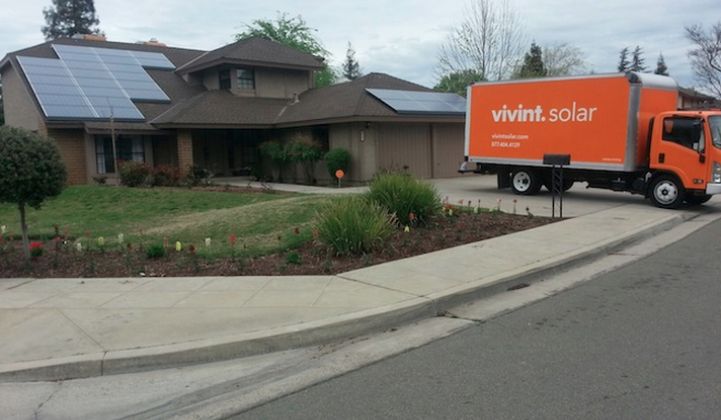With yet another multi-billion-dollar acquisition in the works, SunEdison isn't just strengthening its position as one of the world's top renewable energy developers -- it is on a mission to become one of the largest energy companies in any sector.
This morning, SunEdison announced plans to acquire Vivint Solar, America's second-biggest residential PV installer, for $2.2 billion in cash, stock and convertible notes. The acquisition will give SunEdison 4,000 new employees and a 523-megawatt portfolio of rooftop solar projects.
Those solar projects will be dropped into SunEdison's YieldCo, TerraForm Power, adding $81 million in unlevered cash flow for investors. TerraForm once again increased its guidance on cash distribution per share from $1.70 to $1.75 -- up from $0.90 when the YieldCo first went public last year.
Through 2019, the Vivint portfolio will offer $630 million in cash distributions for TerraForm investors. It will also make TerraForm the largest owner of residential solar projects out of any YieldCo.
SunEdison's top executives are framing the deal as part of an aggressive strategy to rival the world's top energy players, including oil majors and utilities.
"We are building the next generation of the biggest energy companies on earth," said Julie Blunden, SunEdison's chief strategy officer, speaking to GTM before the company's investor call. "We're not waiting to find out who they'll be -- we want it to be us."
The company is on track to add more than 1 gigawatt of renewable electricity projects to its portfolio every quarter.
SunEdison is a leader in large-scale project development, but has struggled to find its place in the residential PV sector. It sold home solar with the help of installation partners, but didn't have a strong team for originating projects -- until now.
Vivint Solar gives SunEdison the best door-to-door solar sales team in the country and one of the largest residential pipelines, behind SolarCity and Sunrun.
"Vivint Solar's competitive advantage lies entirely in its sales capabilities, making up for SunEdison's biggest weakness," said Nicole Litvak, a senior solar analyst with GTM Research. "We've already seen other acquisitions of sales and lead-generation companies in the residential space, such as SolarCity's acquisition of Paramount Solar, and this will not be the last."
On a conference call with investors, SunEdison CEO Ahmad Chatila pointed to Vivint Solar's high sales volume as the top reason for acquiring the company. The deal creates big numbers for the company "without having to do acquisitions over and over," said Chatila.
"With Vivint Solar, we're tripling our value," he said.
The 523-megawatt portfolio offers a lot of value for TerraForm as well. The 19-year contracts were signed at an average price of 14 cents per kilowatt-hour, with 99 percent of them offering a yearly escalator. The average FICO score of the homeowners is 750.
Chatila compared SunEdison's potential to oil majors and mega-utilities. With tens of billions of dollars in contracts being signed throughout the industry annually, Chatila said the market opportunity for renewables is finally catching up with conventional energy.
"We're adding a large oil company in value each year," he said, talking about industry-wide contracted cash flows. "A lot of people don't realize that."
With a roughly $9 billion market cap, SunEdison is a fraction of the size of the biggest oil companies. But the company's YieldCo structure is allowing it to expand at a record-setting pace. It now has 53 gigawatts of projects under development or completed -- nearly equaling the generation fleet of Duke Energy, the biggest electric utility in the U.S.
In January, SunEdison acquired leading wind developer First Wind for $2.1 billion, giving it 521 megawatts' worth of projects to drop into TerraForm. Last month, TerraForm picked up another 930 megawatts' worth of projects from Invenergy.
"These are not small, incremental steps forward. This is a platform shift," said Julie Blunden.
For a detailed look at SunEdison's strategy and corporate philosophy, listen to our interview with Ahmad Chatila:



